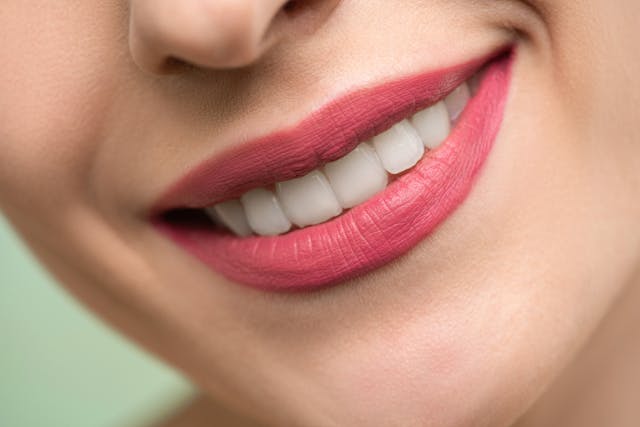
If you’ve ever been told by your dentist that you’re a teeth grinder, you’re not alone. In fact, researchers estimate that 12-31% of adults grind their teeth at night. Many of these people are undiagnosed. And while teeth grinding, otherwise known as bruxism, often happens when you’re asleep, it can also happen when you’re awake.
In this article, we’ll go over the causes and symptoms of teeth grinding, as well as what you can do about it. Keep reading!
Symptoms of teeth grinding
Bruxism can lead to a lot of unpleasant symptoms, including:
- Fractured, chipped, flattened, or loose teeth
- Teeth grinding or clenching
- Worn tooth enamel
- Tooth pain or sensitivity
- Tired jaw muscles
- Locked jaw
- Jaw, neck, or facial soreness
- Dull headaches or migraines
- Sleep difficulties
- Earaches
- Damage to dental fillings
- Temporomandibular disorder (TMD)
What causes teeth grinding?
Of course, many of the symptoms of teeth grinding are undesirable. But what exactly causes teeth grinding? For most patients, there are unique causes of their bruxism, many of which are occurring due to physical, psychological, or genetic factors. For example, teeth grinding is often linked to stress and anxiety, sleep problems such as sleep apnea, and taking medications like SSRIs that are used to treat depression. Other things that can make you more likely to grind your teeth are tobacco, caffeine, and alcohol.
What can help your sleep bruxism
Now that you understand a bit more about what factors can lead to teeth grinding behaviors and what the symptoms of teeth grinding are, it’s important to understand that there are a number of ways teeth grinding can be treated. While there is no complete cure for sleep bruxism, these treatments can help reduce the frequency and impact of them.
Night guards
One of the most common treatments for bruxism are night guards, which are retainer-like mouthguards you wear at night to protect your teeth and mouth. Night guards provide a barrier between your teeth to minimize the damage done when grinding. And while night guards aren’t a cure to sleep bruxism, they can also help reduce headaches and improve the quality of your sleep. Visit your dentist to ask if you’re a candidate (or come visit us if you’re in the Burbank area!).
Botox
While Botox injections are often used for aesthetic reasons, they can also be used to temporarily relax your jaw muscles and reduce pain from grinding. Botox can also help diminish the frequency and symptoms of migraines. Make sure to ask your dentist if they offer Botox injections, which you will be getting in your head and neck muscles roughly every 12 weeks.
Stress-reduction
As stated before, stress and anxiety can lead to teeth grinding. So, finding ways to manage your stress and anxiety can help you to reduce symptoms of teeth grinding. Three ways people can do this are with meditation, professional help, and exercise.
Meditation
Meditation can help reduce stress and anxiety by promoting relaxation, calming the mind, and improving emotional well-being. It encourages mindfulness, which allows you to focus on the present moment and can help with anxiety. The benefits of practicing mediation can often be felt in just one session.
Professional help
Getting professional help for your stress and anxiety is also an option if other things you’ve tried are not working. This comes in many forms, like cognitive-behavioral therapy, talk therapy, and prescription medication.
Exercise
Exercise can reduce stress and anxiety by releasing endorphins, which can improve your mood and act as a natural painkiller. It can also improve your physical health, promote better sleep, and improve your overall mental well-being.
Lifestyle changes
There are also certain lifestyle changes that you can make to help you stop grinding your teeth. For example, since tobacco, caffeine, and alcohol can make you more likely to grind your teeth, avoiding them as much as possible can be beneficial.
Mouth exercises
There are several mouth exercises that can help reduce pain and improve your jaw’s range of motion. Check out two exercise suggestions from the Sleep Foundation. You can also ask a dentist for a specific mouth exercise routine to avoid injury and make sure you’re doing it correctly.
Massages
Head and neck massages can also help stop teeth grinding by reducing tension. Head massages can also help ease migraine and headache pain, reduce stress, and promote relaxation. You book regular message appointments with a professional, or you can even give yourself a head massage.
Visit Dr. Ruiz & Associates for a dentist in Burbank
If you have experienced some of the symptoms of teeth grinding and are looking for a dentist in Burbank or the Burbank area, come visit our office, Dr. Ruiz & Associates, Inc. We can help! Dr. Ruiz is a respected dentist, educator, and researcher who focuses on supra-gingival, minimally invasive healthy dentistry. He has even developed a smile design technique that dentists all around the world use, so you’re in good hands when you come to our office. Check out our Google reviews and schedule an appointment with us!




